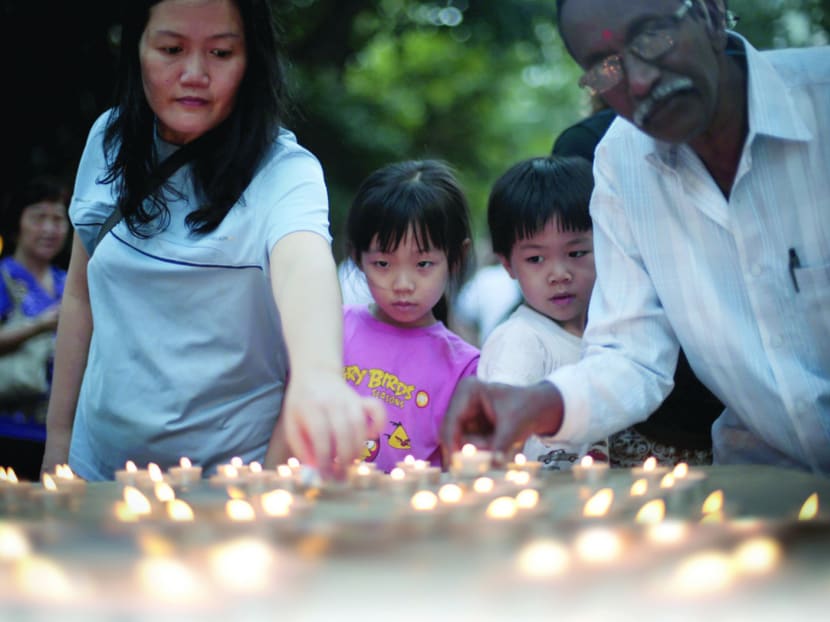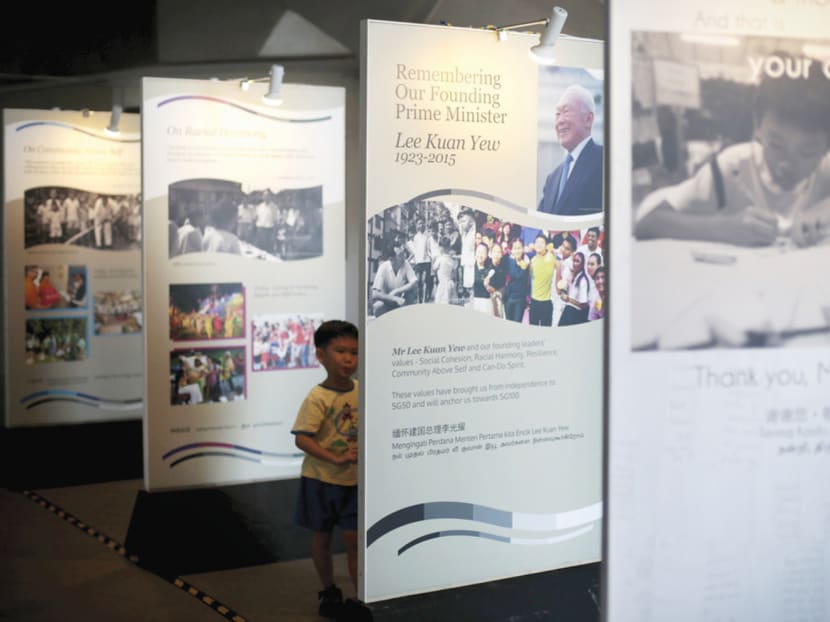The Singapore spirit, renewed
SINGAPORE — There was a time when it would have been simply impossible to imagine a Singapore without Mr Lee Kuan Yew. Even in his later years, the Republic’s first Prime Minister was a larger-than-life presence, with lawmakers, businessmen and leaders both here and abroad hanging on to his every word. Such was the influence of the man who had been synonymous with the transformation of Singapore from backwater to Asian Tiger in just a single generation.


SINGAPORE — There was a time when it would have been simply impossible to imagine a Singapore without Mr Lee Kuan Yew. Even in his later years, the Republic’s first Prime Minister was a larger-than-life presence, with lawmakers, businessmen and leaders both here and abroad hanging on to his every word. Such was the influence of the man who had been synonymous with the transformation of Singapore from backwater to Asian Tiger in just a single generation.
Yet, his death on March 23 last year did not shake the very foundations of what Mr Lee spent his life building, contrary to what some had feared. As People’s Action Party chairman Khaw Boon Wan put it last week, Mr Lee’s death “did not cause any jitters among investors or (a loss of) confidence among the people. There was widespread sadness, but there was no despair or helplessness”.
Mr Khaw hit the nail on the head.
But he left unsaid something more important than the fact that no jitters were felt in the days after March 23, 2015: Those fateful days of a year ago have had a profound effect on Singaporeans. Confronted by the loss of a giant of a man, Singaporeans had a chance to reflect on the spirit of exceptionalism that had driven the creation of a nation, be reminded of the extraordinary sense of purpose that Mr Lee embodied, and absorb anew the principles that form the bedrock values of the Republic.
Bouyed by this, Singaporeans young and old now have high levels of confidence in the country’s future, even as murky economic waters cloud the outlook, showed a survey commissioned by TODAY that took the pulse of 500 respondents aged 15 to 70.
There is no doubt that Mr Lee is missed. The more than 100 ground-up initiatives that have sprung up all over the island in the days leading up to the first anniversary of his death are a reminder of that. In Tanjong Pagar, in particular, where Mr Lee was Member of Parliament for six decades, thousands of residents as well as people who used to live there gathered to pay their tributes over the weekend, and remind themselves from whence they came, and where the country is headed.
One of them was Mr Chew Kok Leong, 76, who was grateful to Mr Lee for touching his life and transforming the country, whose streets were once filled with gangsters and people who were jobless. “The country was in a state of chaos, and finding a job was difficult. He managed to govern Singapore very well — turning it into what it is today,” said the retiree, who made the short hop from his Tiong Bahru home to Duxton Plain Park, where a remembrance event to honour Mr Lee was held on Saturday. The next day, Mr Chew returned with a bouquet of white flowers.
Over at Marine Parade, Mr Muhammad Nur Hakimin, 26, chanced upon an exhibition on Mr Lee at the Marine Parade Community Club when he and his wife were out and about with their four children. The SMRT technician saw it as a perfect opportunity to teach his children —aged between one and six years old — about the values and work of Mr Lee. “He was like family to everyone in Singapore. He (dedicated) his life to us… he turned nothing into something. Without his efforts, there would be no home,” Mr Hakimin said, as he recounted how Mr Lee’s values inspired him to work harder when he was struggling to make ends meet for the family as a young father.
Over his lifetime, Mr Lee inspired many and cobbled a people of disparate backgrounds together into a nation, while navigating a seemingly endless series of obstacles, applying ingenuity, attention to detail, foresight and sheer force of will in equal measure.
In death, he has continued to do so.
Acting Minister for Education (Schools) Ng Chee Meng, who headed the organising committee for Mr Lee’s State Funeral, saw first-hand Singaporeans’ outpouring of grief during the seven days of national mourning. That experience will stay with him for a long time, he said as he begins his own political journey as part of Singapore’s fourth-generation leadership core. “This affirmation of Singaporeans’ unity... gave me great optimism about Singapore’s way forward,” he told TODAY in an interview to mark Mr Lee’s death anniversary.
While he is no longer around, Mr Lee’s values, such as multiracialism, meritocracy and incorruptibility, which have become entrenched in public institutions and society at large, will continue to live on, political observers and MPs said. National University of Singapore political scientist Bilveer Singh noted that basic principles, such as meritocracy, are evergreen. “The day certain people are given more privilege than others, we will see a serious decline in Singapore’s prosperity and peace,” he said. Still, Singapore Management University law don Eugene Tan noted the country is transitioning towards a more broad-based measure of merit, beyond academic excellence.
On Mr Lee’s legacy, political analyst Felix Tan from SIM Global Education reiterated the need to see the founding Prime Minister’s accomplishments in context. Mr Lee had to do what he did in an era that was very different from the present, he said.
Prof Singh added: “Today, Singapore’s success will be measured not just economically, but also via other indices such as democracy, human rights… (Beyond) economic growth, we may not always look good.”
Not all of Mr Lee’s values and principles are universally embraced. He had his critics, who decried his authoritative style and the ruthless approach he used to deal with political opponents. But the plusses far outweigh the criticisms. About three-quarters of the respondents in the TODAY survey cited Mr Lee’s integrity, intelligence and wisdom, his zero-tolerance for corruption as the top qualities that Singapore’s leaders “must definitely” emulate. Propping up the list were Mr Lee’s ruthlessness in dealing with political opponents, his distaste for Western-style democracy and his handpicking of top Government officials.
NUS sociologist Tan Ern Ser felt the findings showed that Singaporeans “appreciate his wise, decisive and pragmatic leadership, but not what they would consider his authoritarian, paternalistic style of ruling the country”.
Still, observers were quick to point out that the Government’s leadership style had evolved long before Mr Lee’s death — and he had a big part to play in laying the groundwork for these changes.
“Today, the Government (is) a lot more lax in that regard — a lot more willing to engage in discourse, argue in the public sphere, rather than find a way to correct unjustified statements or allegations through lawsuits,” Nanyang Technological University Assistant Professor Woo Jun Jie said.
During his interview with this newspaper, Mr Ng stressed that it is up to the next generation of Singaporeans to decide whether they want to hold on to the values and principles that Mr Lee stood for. “They will be able to judge for themselves what would be the best way forward for Singapore,” he said. And he was confident that they will be able to make the right call.
Indeed, for a country that recently lost a monumental figure in its short history, Singaporeans and their leaders alike now exude a level of confidence — not just about its future but also in its place in the world — that some might say is disproportionate to its size.
In an interview with TODAY, Ambassador-at-Large Bilahari Kausikan revealed that since Mr Lee died, some countries have tried their luck to put Singapore in its place: “... All I will say is that if they persist, they will be in for a rude surprise,” he said.
He added: “They think our ability to stand firm only depends on Lee Kuan Yew — that’s rubbish. Or if they think that now he’s not around you can re-do things, no, sorry…”
In many ways, the confidence that Singapore oozes as it heads into the next phase of development is testament to the work of Mr Lee and his team, and stems from their lifelong efforts to prepare the country and its people for challenges well into the future. That Singaporeans have renewed confidence and a new unity of purpose just 366 days after the nation awoke to a statement informing them that they had lost their founding Prime Minister is testament to how well the Founding Fathers laid the groundwork for success.
Now, as the saying goes, Singaporeans have to take the ball and run with it.











